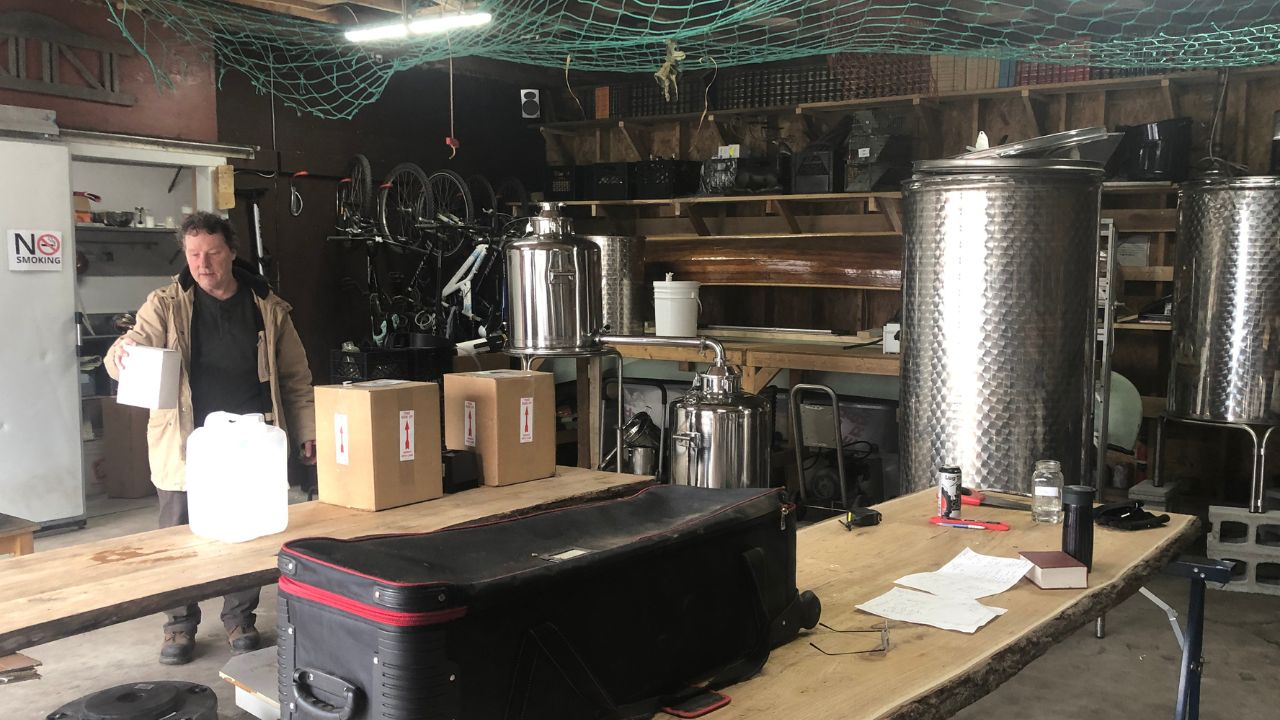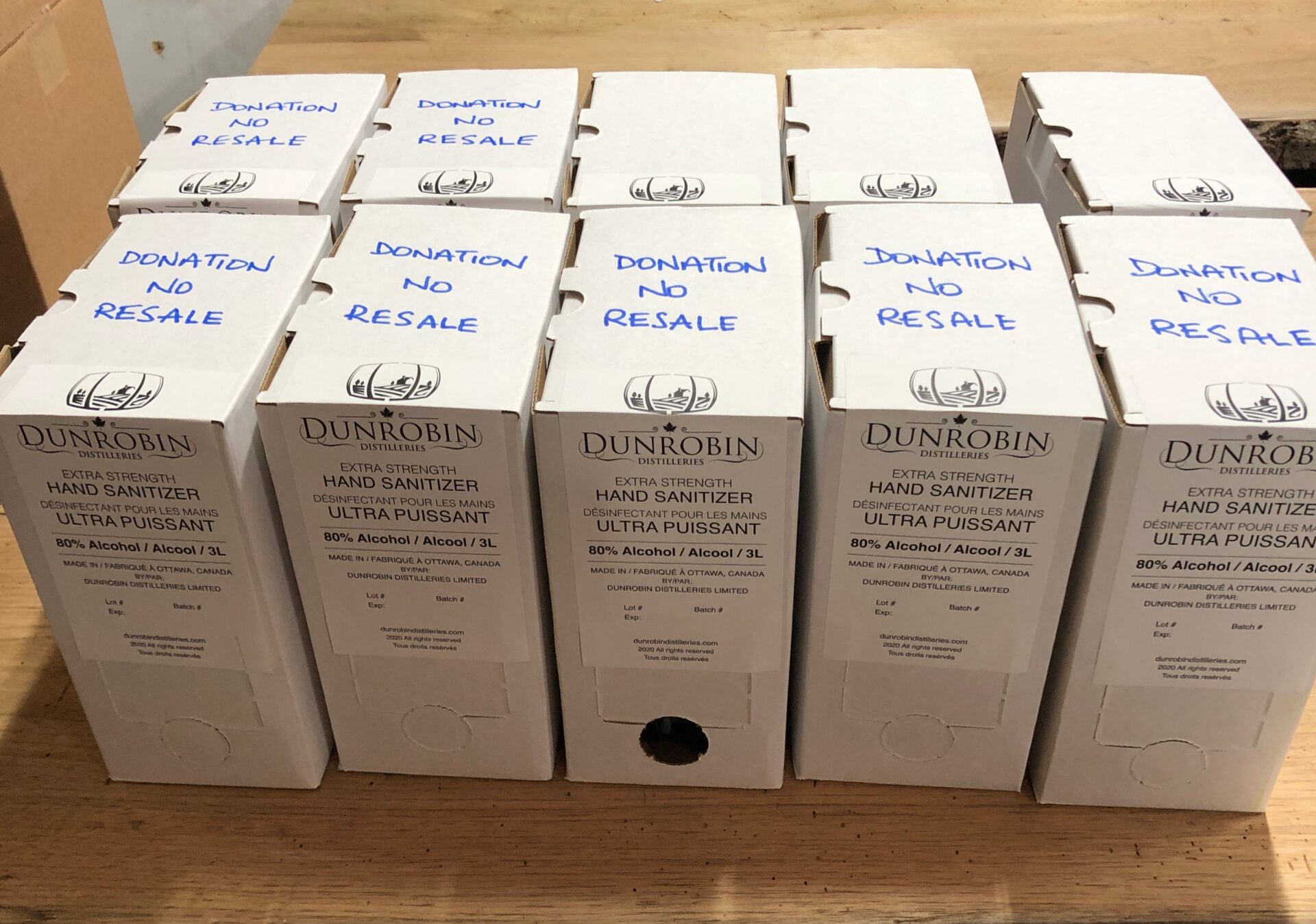Whether it was turning vodka into hand sanitizer or cutting plexiglass into sneeze-guards, local businesses that supplied Ottawa – and beyond – with critical products and services during the pandemic say their efforts have only made them stronger.
“It was an interesting time, to say the least,” recalls Jonathan Hatchell, vice-president at Dunrobin Distilleries, which made hand sanitizer for The Ottawa Hospital and various shelters and non-profits around the region, most donated free of charge.
“There was no other business, it would have been this or go bust,” Hatchell explains, adding that the distillery had just received its distilling license on Dec. 22, 2019. “We were selling online and just getting ready to expand into the pubs and then COVID hit.”
OBJ360 (Sponsored)

Ottawa’s growth is at an inflection point
One thing the Welch LLP Business Growth Survey taught us this year is most of the business community thinks we’re on track, but have a ways to go.

Get ready to ROCK! The Lumière Gala returns to the Brookstreet this September
Brookstreet has always been a rock star in the world of hospitality. Now, the hotel is truly embracing the rock and roll vibe with this year’s themed gala in support
When the World Health Organization released a recipe for hand sanitizer, Hatchell says he and his team started making small batches at the farm in Dunrobin. Then they started hearing from organizations across the city in dire need, says Hatchell, who fielded phone calls from Lee Valley Tools and Giant Tiger, various hospitals and associations, the National Capital Commission, the City of Ottawa, and more.
“What we found was that we couldn’t keep up … We found ourselves in March (2020) knee-deep in mud at the farm and knew we needed a bigger facility.”

Hatchell was good friends with Beau’s Brewery co-owner Steve Beauchesne, whose facility was sitting unused due to the pandemic, and so Dunrobin Distilleries quickly moved in.
“I told (Steve) we needed space and asked, ‘Can we move to your facility and start operating? We could use your loading dock,’” recalls Hatchell. “He had extra staff that weren’t being utilized and I moved my staff out there.”
When Toronto’s Steam Whistle Brewing bought Beau’s in early 2022, Dunrobin Distilleries purchased the building and leased back a third of it to the beer company.
Real estate aside, Hatchell says the company had to learn to adapt and be innovative.
“When we started we were purists; we wanted to make the best whiskey in the world and sometimes you can’t be on the same plan,” he says. “The market is always changing and you have to adapt.”

That new mindset led Dunrobin Distilleries to offer canned cocktails in addition to its classic bottled spirits.
“In our short life of four years, we’ve pivoted more than a ballet dancer,” Hatchell laughs. “We would have done anything to keep the doors open and it was a team effort.”
For Omid McDonald, the founder of Dairy Distillery in Almonte, pivoting to making hand sanitizer caused his company to “mature a decade’s worth within a year.”
When the pandemic hit, Dairy Distillery had been in business for only a year and McDonald was focused on creating “the future of cream liquor” with Vodkow, a vodka made from milk sugar.
“We had vodka ready for bottling and then we got calls from people desperately looking for hand sanitizer,” McDonald says. “It was a whirlwind from there.”
What started as a seven-person team quickly tripled as Dairy Distillery scaled up production to work around the clock converting vodka into sanitizer, which it supplied to the City of Ottawa and The Ottawa Hospital for more than a year.
The team was crammed into the company’s original facility, unable to physically distance, so McDonald rented a warehouse three blocks away for more space. He also invested in new equipment to keep up with demand. With a provincial grant to support the sanitizer scale-up, he has since doubled the size of the distillery.
McDonald learned some personal and leadership lessons along the way. He’s worked in business for 30 years, but says this was the “first time I ever had these kinds of moral questions put on me.”
“The Ottawa Hospital will pay a certain amount and you could get 10 times more from a private company and you have to make that decision,” he explains. “We had offers from people willing to sell us industrial alcohol, which was dubious, and we passed because we wanted to maintain Health Canada’s highest standards. We navigated that well.”

In the end, his company grew in more ways than one. “Our team was put under fire and they made it through. They worked around the clock with a sense of purpose,” he says.
The company as a whole learned new skills that they use today. While the core technology that Dairy Distillery uses converts dairy byproducts into alcohol, the pandemic showed McDonald a whole new world of possibilities.
“In the beginning, we had no idea it could be used for sanitizer,” he says. “Now, we’re working on a project to use our technology to create ethanol for transportation fuel.
“It forced us all to think bigger, especially when you’re not good with a stressful situation … a huge ramp-up in production made the whole team think about things we maybe wouldn’t have had (if) the team (had) grown more naturally. It matured us and made us a much better business.”
At Ottawa’s Sinix Media Group, owner and founder Hamed Zadeh also knows a thing or two about a pandemic pivot. As a print services firm that supplies many of Ottawa’s festivals, trade shows and events, business came to a grinding halt when COVID hit.
“In a matter of five days, everything got cancelled, I lost everything overnight,” Zadeh remembers. “So I had to come up with something different to survive.”
After hearing about demand for plastic face shields, Zadeh took to the internet to research the Health Canada requirements and within four days had secured a manufacturing licence. He supplied hospitals with the clear plastic shields, sourcing his materials as locally as he could.
“It was a hard time for everybody, so we bought everything from Canada.”
Soon, the demand for his products was through the roof.
“Everybody was so scared to leave the house, so we had a hard time hiring people. Finally, we made production lines and opened a second shift,” he recalls. “We didn’t lay off anybody, but hired 20 people.”
Zahed had some extra plexiglass laying around and so he decided to “do a second pivot” and started manufacturing sneeze-guards for retail stores, supplying places like Gabriel’s Pizza and the Ottawa Catholic School Board.
“Our website crashed because the demand was so high,” says Zahed. “By the end of the pandemic, we sold 190,000 sneeze guards to retail stores.” Including sales to schools, the total number of guards sold was about 450,000, he says.
Sinix was busy shipping products across Canada and saw a 72-per-cent increase in revenue. The company moved to a 6,500-square-foot facility, more than double the previous space, and purchased new equipment. Zadeh says he gained 1,280 new customers.
In the thick of it, he says he was working an average of 16 hours per day and sleeping on a couch in his office.
“That’s hard work and it was paying off because people were recognizing it,” he explains. Zadeh is a Forty Under 40 recipient and saw his company recognized for customer experience at the 2022 Best Ottawa Business Awards.
“The team is stronger because they saw a hard period and we changed our whole business overnight,” he says. “And it feels good to be able to give back to the community; they helped us when we needed it and now it was our time.
“Because of that pivot, now our skin got thicker,” he adds. “When something happens to us, now we say, ‘Well, we survived the pandemic.’”





